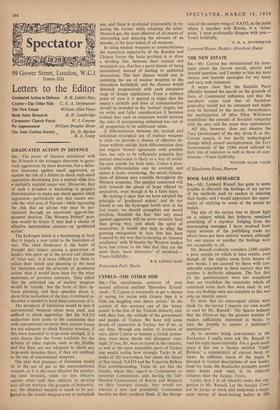Letters to the Editor
Graduated Action in Defence B. H. Liddell Hart Cyprus—The Other Side C. R. A. Swynnerton The New Estate William Allan Vause Book Sales Research R. H. Langbridge Cirencester Church Porch W. 1. Croome No Appeasement William Douglas Home The John Gordon Society Dr, D. Bardon
B. A. Young GRADUATED ACTION IN DEFENCE
SIR,—The power of 'massive retaliation' with the H-bomb is the strongest deterrent to great- scale aggression, by mass invasion, but a defec- tive insurance against small aggression, or against the risk of a failure to check such small aggression developing into a mutual slide• into a mutually suicidal major war. Moreover, fear of such a prospect is weakening to people's determination to make any stand against small aggression—particularly any that occurs out- side the vital area of Europe—while increasing the risk that an all-out war may be pre- cipitated through an emotional spur-of-the- moment decision. The Western Powers' posi- tion would be firmer if they had a choice of effective intermediate courses—or 'graduated action.'
The hydrogen bomb is a boomerang so fatal that it impels a new trend to the limitation of war. The chief hindrance is the habit of thought that lingers among a generation of leaders who grew up in the period and climate of 'total war.' It is more difficult for them to adjust their minds and planning to the need for limitation and the principle of 'graduated action' than it would have been for the wiser statesmen of previous centuries. They admit that the unlimited use of nuclear weapons would be 'suicide,' but the form of their de- fence planning, and their speeches about it, show little realisation of the fact. Continued re- iteration is needed to keep them conscious of it.
The prospects of limitation would be best if conventional weapons alone were used, and sufficed to check aggression. But the NATO authorities have come to the conclusion that with conventional weapons their present forces are not adequate to check Russian invasion, if this were launched in large-scale strength. It is even clearer that the forces available for the defence of other regions, such as the Middle and Far East, are not adequate to check any large-scale invasion there, if they are confined to the use of conventional weapons.
The next best prospect of limitation would lie in the use of gas as the unconventional weapon, as it is the most effective for paralys- ing land invasion, while far less effective against cities—and thus unlikely to develop into all-out warfare. On grounds of humanity, too, the chemical weapon is much to be pre- ferred to the atomic weapon even in battlefield
use, and there is profound irrationality in re- jecting the former while adopting the latter. Mustard gas, the most effective of all means of obstructing and delaying the advance of an invader, is the least lethal of all weapons.
In using nuclear weapons to counterbalance the numerical superiority of the Russian and Chinese forces the basic problem is to draw a dividing line, between their tactical and strategical use, that has a good chance of being maintained, instead of leading to unlimited destruction. The best chance would rest in confining the use of nuclear weapons to the immediate battlefield, and the chances would diminish progressively with each successive stage of deeper application. From a military point of view it is natural to argue that the enemy's airfields and lines of communication should be included in the 'tactical' targets, but on wider and fuller consideration it becomes evident that such an extension would increase the risks of precipitating unlimited war out of all proportion to its additional value.
A differentiation between the tactical and unlimited strategical use of nuclear weapons is vital—to provide a chance of effective de- fence without suicide. Such differentiation does not require formal agreement with possible foes, but only to be sufficiently palpable that mutual observance is likely as a way of avoid- ing sure suicide for both sides. Unless a prac- ticable differentiation can be evolved, and unless it looks convincing, the moral founda- tions of defence may crumble throughout the Western countries. The peoples concerned will drift towards the gleam of hope offered by neutralism, even though it be a faint hope.
By making it clear that we have adopted the principle of 'graduated action,' and do not intend to use the hydrogen bomb save in the last resort, we should strengthen our moral position, diminish the fear that any stand against aggression will be more certainly fatal than giving way, and check the spirit of neutralism. It would also help to allay the growing antagonism in Asia that has been fostered by the way that in harping on 'massive retaliation' with H-bombs the Western leaders have lent colour to the idea that they are the most likely 'mass destroyers' of mankind,— Yours faithfully,


































 Previous page
Previous page